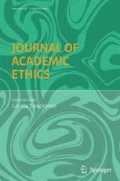Abstract
Academic ethics among students at an undergraduate level are dictated by a variety of factors. Institutional cultures, personal preferences and notions of ethics, external factors, and peer-pressure are some of the factors that play an important role in the ethical behavior of an undergraduate student. The present study is an attempt to understand the student behavior in a three year old technical Institute in India. At a time when the higher technical education sector in India is rapidly expanding, the study presents trends in undergraduate students regarding academic ethics. The study highlights the factors that are most important in governing ethical behavior of students, and allow for corrective measures at a formative stage in the Institute’s life.
References
Baird, J. S. (1980). Current trends in college cheating. Psychology in the Schools, 17, 515–522.
Bowers, W. J. (1964). Student dishonesty and its control in college. New York: Bureau of Applied Social Research, Columbia University.
Buckley, M. R., Wiese, D. S., & Harvey, M. G. (1998). An investigation into the dimensions of unethical behavior. Journal of Education for Business, 73(5), 284–291.
Canning, R. (1956). Does an honor system reduce classroom cheating? An experimental answer. Journal of Experimental Education, 24, 292–296.
Eisenberger, R., & Shank, D. M. (1985). Personal work ethic and effort training affect cheating. Journal of Personality and Social Psychology, 49, 520–528.
Hoover, E. (2002). Honor for honor’s sake? Chronicle of Higher Education, 3, 35.
Jendrek, M. P. (1989). Faculty reactions to academic dishonesty. Journal of College Student Development, 30, 401–406.
Kidwell, L. A. (2001). Student honor codes as tool for teaching professional ethics. Journal of Business Ethics, 29(1), 45–50.
McCabe, D. L., & Treviño, L. K. (1997). Individual and contextual influences on academic dishonesty: a multicampus investigation. Research in Higher Education, 38, 379–396.
McCabe, D. L., Treviño, L. K., & Butterfield, K. D. (1999). Academic integrity in honor code and non-honor code environments: a qualitative investigation. Journal of Higher Education, 70, 211–234.
Michaels, J. W., & Miethe, T. D. (1989). Applying theories of deviance to academic cheating. Social Science Quarterly, 70, 870–885.
Perry, A. R., Kane, K. M., Bernesser, K. J., & Spicker, P. T. (1990). Type A behavior, competitive achievement-striving, and cheating among college students. Psychological Reports, 66, 459–465.
Singh, V., Kumra, S., & Vinnicombe, S. (2002). Gender and impression management: Playing the promotion game. Journal of Business Ethics. Dordrecht. 37(1) part 2, 77–90
Tittle, C. R., & Rowe, A. R. (1973). Moral appeal, sanction threat, and deviance: an experimental test. Social Problems, 20, 488–497.
Ward, D. A. (1986). Self-esteem and dishonest behavior revisited. Journal of Social Psychology, 126, 709–713.
Ward, D. A., & Beck, W. L. (1990). Gender and dishonesty. Journal of Social Psychology, 130, 333–339.
Weber, E. U., Blais, A., & Betz, N. E. (2002). A domainspecific risk-attitude scale: measuring risk perceptions and risk behaviors. Behavioral Decision Making, 15(4), 263–290.
Acknowledgements
The author thanks all the anonymous students at the Institute for participating in the survey.
Author information
Authors and Affiliations
Corresponding author
Appendix I
Appendix I


Rights and permissions
About this article
Cite this article
Saini, S. Academic Ethics at the Undergraduate Level: Case Study from the Formative Years of the Institute. J Acad Ethics 11, 35–44 (2013). https://doi.org/10.1007/s10805-012-9169-0
Published:
Issue Date:
DOI: https://doi.org/10.1007/s10805-012-9169-0

